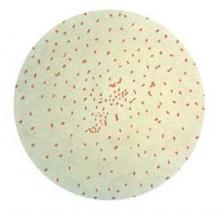SAN FRANCISCO – The pertussis component of the DTaP vaccine may not be as immunogenic or long lasting as once thought, according to Dr. Sarah Long.
In fact, there is evidence that the Tdap booster – currently recommended for children, adolescents, and adults aged 11 years or older – should be administered earlier, she said at the annual Interscience Conference on Antimicrobial Agents and Chemotherapy.
In an analysis of the 2010 pertussis outbreak in California conducted by the Kaiser Permanente Medical Center in San Rafael – which provides care to about 40% of Marin County’s quarter million residents – investigators found a markedly increased rate of disease in children aged 8-12 years. There were 171 confirmed cases of pertussis at the center from March 1 to Oct. 31, 2010, with 132 of the cases occurring in pediatric patients. The disease peaked in children aged 12 years.
"The possibility of earlier or more numerous booster doses of acellular pertussis vaccine either as part of routine immunization or for outbreak control should be entertained," the investigators wrote (Clin. Infect. Dis. 2012;54:1730-5).
A second study, which also analyzed data from the California outbreak, found that protection against pertussis waned substantially after the DTaP series, which children usually complete by age 7 years. Risk of the disease rose 42% each year after the end of the series (N. Engl. J. Med. 2012;367:1012-9).
However, administering the Tdap booster earlier comes with its own concerns, said Dr. Long, chief of the section of infectious diseases at St. Christopher’s Hospital for Children in Philadelphia.
Administering an earlier Tdap booster would require a second booster for teenagers. "If you gave the first dose, for instance, at 8, and then you decided to give another one at 14 or 15, well ... we don’t immunize 14- and 15-year-olds very well. Would you gain enough by giving Tdap earlier, or would you lose more because you are shifting the second dose to teenagers? How much is there to lose by maybe failing to give the second dose?" she said.
Also, Tdap isn’t licensed for two doses in the United States, and the safety of two doses is unknown.
Given the complexities, the Centers for Disease Control and Prevention’s Advisory Committee on Immunization Practices (ACIP) has not made any decisions on whether to change the Tdap schedule. "It’s something that will have to be considered," said Dr. Long.
Another option is give stand-alone pertussis boosters, said session moderator Dr. Kathryn Edwards, director of the Vanderbilt University vaccine research program, Nashville, Tenn., and a member of the Pertussis Vaccines Work Group of ACIP.
"The longer between that last DTaP dose and the Tdap, the greater the case burden. The current pertussis vaccination schedule is not effective at preventing outbreaks. There is a need for earlier or more frequent boosters or more effective pertussis vaccines," Dr. Edwards said in an interview at the meeting, which was sponsored by the American Society for Microbiology.
Overall, 171 people at the San Rafael medical center, the majority of whom were children, tested positive for Bordetella pertussis by polymerase chain reaction testing. The authors calculated that DTaP pertussis effectiveness was 41% for 2- to 7-year-olds, but only 24% for 8- to 12-year-olds, "suggesting that the vaccine isn’t very effective in that age group," Dr. Edwards said. The effectiveness in 13- to 18-year-old patients rose to 79%; many had gotten the Tdap booster.
There were more than 8,000 pertussis cases in the California outbreak. Ten children died, one a premature infant and the rest children who were unvaccinated against the disease. It’s unclear if Bordetella strains not covered by the vaccine played a role in the outbreak, she said.
Dr. Long and Dr. Edwards said they had no relevant financial disclosures.

